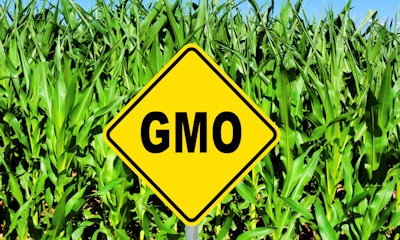

The idea of labeling food for genetically modified organism ingredients, or use, is a tricky and controversial issue. And we've already seen one Senate bill go down to defeat though that same bill could rise again before the session is over. Some loud consumer groups want to see labeling - we assume in the hopes that consumers will run to the exits, or at least to the "buy organic" aisle.

APPROPRIATE SIGNAGE? The controversy over labeling foods for GMO content continues to simmer both in state houses and on Capitol Hill. (Photo: badmanproduction/Thinkstock)
Food manufacturers, long opposed to new labeling, now want a national standard but they want it to be voluntary. The 'national' approach was to blunt the rise of state-by-state rules that could, and would, be different. That's a challenge they allege would raise prices and cause more confusion. During Commodity Classic earlier this year, Secretary of Agriculture Tom Vilsack actually said he was in favor of a mandatory label, in part to get something passed.
The idea of the "smart" label keeps getting floated. That's a label you would scan with your smartphone (and we know everyone has one) and it would open a mobile friendly web page telling you the story of the product and its ingredients; and hopefully explain the safety of GMOs. Consumer groups aren't fans of the idea. They want a label screaming off the package and for some I think they'd be happy if it also blinked red, pulsating with a warning to the unwary consumer.
Labels and food
Ingredients that are cast in an unfriendly light and labeled can hurt an industry. With a range of global health organizations - including European groups - signing off on the safety of GMOs, a label that might imply harm is neither accurate nor valuable to the consumer.
My friend, Broadcaster Orion Samuelson, keeps asking 'show me the bodies' of people harmed or killed by GMO foods. And none have been brought to his attention.
I won't dwell on the anti-GMO claims that keep surfacing, that's for another day. However, the labeling issue is now passing from voluntary to mandatory as more food companies move forward ahead of a July 1 deadline to label GMO content for Vermont.
That state's labeling law - which exempts a few interesting items like alcoholic beverages though many are made with GMO ingredients (unless labeled otherwise); foods bearing USDA-approved labels; foods for immediate consumption (like in a restaurant); and food verified by a qualifying organization. That's just a few.
It's interesting to note the wine industry uses GMO-enhanced yeasts to boost productivity and enhance quality control. Cheese is made with rennet produced through genetic engineering - though no GMO content exists in the finished rennet this higher-producing additive would not exist without the technology. (Note soybean oil, from genetically engineered soybeans contains no GMO content either but would be labeled in Vermont because it came from GMO soybeans - go figure).
One final note: High fructose corn syrup - a sugar equivalent sweetener - was tagged as a bad boy and several companies have removed it from their products. Heinz Ketchup had it removed, but later restored it since the higher cost of other sweeteners hurt profits.
Sales were not changed when HFCS was returned to the mix. Labels may not mean that much anyway, so food makers' moves to label on their own - including General Mills and Campbell's Soup could make some headway in calming this controversy. It's a true wait-and-see challenge.
About the Author(s)
You May Also Like




